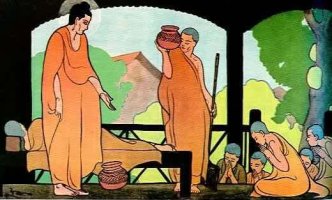SICKNESS AND HEALTH

Sickness (àtaïka, gela¤¤a or roga) is the malfunctioning of the organism due to infection or injury. Numerous types of sickness are mentioned in the Buddhist scriptures including jaundice, fever, ulcers, cough, hay fever, diabetes (madhumehika, literally `honey urine') and leprosy. If every sickness were caused by past kamma, as some misinformed Buddhists maintain, then taking medicine would be pointless. The Buddha listed eight causes of sickness, only one of which is kamma. The other causes are an imbalance of bile, an imbalance of phlegm, an imbalance of wind, an imbalance of all three bodily humours combined, change in the weather, carelesness and accidents (S.IV,230). In another place he said that a poor diet can also lead to sickness (A.III,144) as can overeating (M.I,473). Seasonal sicknesses caused by the wind, heat or humidity were also recognized (Vin.I,199). According to legend, seeing a sick man was one of the four sights that led to Prince Siddhattha deciding to renounce the world and search for the Truth.
The Buddha defined health (appàbàdhatà, àrogya or kalla) as `having well-being and good digestion, not being over-cold or over-hot, balance, and being capable of activity' (A.III,103). He considered good health to be a true blessing and an important prerequisite for practising the Dhamma saying: `Good health is the highest gain' (Dhp.204). He advocated a light diet because it contributes to `freedom from illness, to health, to strength and to physical ease' (M.I,473) and he was aware of the connection between exercise and health (A.III,30; Vin.II,119). He also asked his disciples to contemplate the blessings of having good health and to use the opportunity to practise the Dhamma (A.III,103). Emphasizing the connection between personal virtue and health, the Bhesajjama¤jåsà, an ancient Buddhist medical work, says: `The person who adheres to healthy food habits and behaviour, who is circumspect, not attached to worldly pleasures, generous, equally disposed towards others, truthful, forgiving and who associates with the wise, will be free from illness.'
The Buddha said that employers have an obligation to look after their employees when they are sick (D.III,191). He considered visiting and caring for the sick to be virtuous acts and out of compassion he did both. While physical sickness can be a hindrance to the spiritual quest, the Buddha maintained that with patience, detachment and determination one can transcend these difficulties.`You should train yourself thinking ßThough my body be sick, my mind shall not be sick û.' (S.III,1). He said: `He who would nurse me, should nurse the sick' (Yo bhikkhave maü upaññaheyya so gilànaü upaññhahissati, Vin.I,301-2). Commenting on these words, the Saddhammopàyana says: `Nursing the sick was much praised by the Great Compassionate One and is it a wonder that he would do so? For the Sage sees the welfare of others as his own and thus that he should act as a benefactor is no surprise. This is why attending to the sick has been praised by the Buddha. One practicing great virtue should have loving concern for others.' The apocrathal Brahmajala Såtra makes the same point. `If a disciple of the Buddha sees anyone who is sick, he should provide for that person's needs as if he were making an offering to the Buddha.'